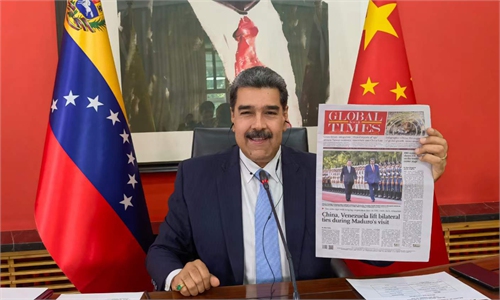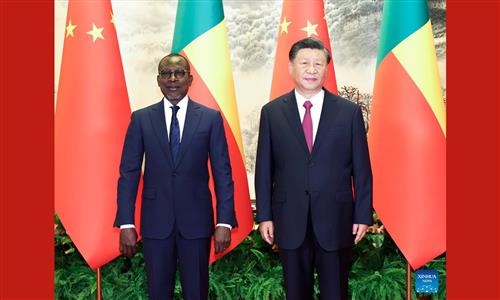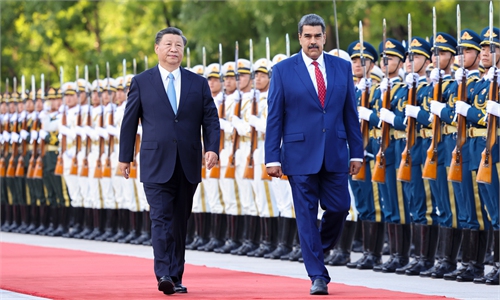China’s week-long diplomatic agenda witnesses fruitful results
Ties with Zambia lifted, ironclad friendship with Cambodia cemented
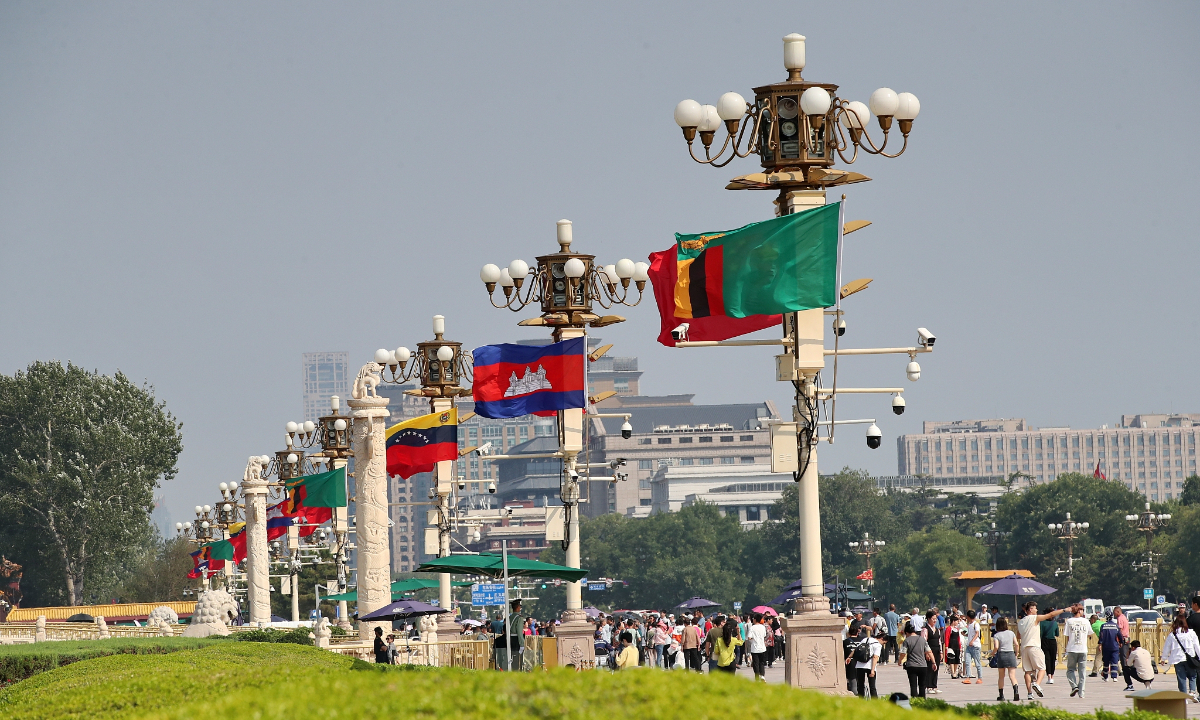
Photo:VCG
The week saw a packed new round of diplomatic activities for China, with fresh outcomes achieved on Friday as China and Zambia announced they were lifting their ties to a comprehensive strategic cooperative partnership during Zambian president's ongoing China visit. Meanwhile, China and Cambodia consolidated their ironclad friendship with a visit by Cambodia's new Prime Minister to China.
The wide-ranging, busy schedule of visits to the nation by several foreign leaders from developing countries and new emerging markets and the signing of a slew of cooperation documents showed these nations' recognition of China's role as a responsible major country. While the US and some Western countries are working to build fences, China and the majority of developing countries are widening their friend circle, expanding pragmatic cooperation and strengthening the development of the Global South to inject more stability into the world, analysts said.
The traditional friendship forged by the two countries' older generations of leaders has stood the test of the changing international landscape, and the Tanzania-Zambia Railway has become a symbol of China-Africa friendship, Xi told Hichilema.
While meeting with Cambodian Prime Minister Hun Manet in Beijing on Friday, Xi pointed out that Hun Manet chose China as the destination for his first bilateral visit after taking office, which fully demonstrates the great importance the new Cambodian government attaches to consolidating and developing China-Cambodia friendship.
China and Cambodia are ironclad friends. Over the past 65 years since the establishment of diplomatic ties, the two sides have always maintained a high degree of mutual trust, treated each other as equals, achieved win-win results, and firmly supported each other in safeguarding national sovereignty, security and development interests, Xi said.
In addition to leaders from Zambia and Cambodia, China has hosted several other leaders from developing countries in recent weeks with a series of diplomatic achievements being made. For example, President Xi met with Venezuelan President Nicolas Maduro Moros on Wednesday, and they jointly announced the elevation of the two countries' relations to an all-weather strategic partnership.
These diplomatic activities highlight the fact that more developing countries are pursuing autonomy in their diplomacy unaffected by the ill-intentioned instigation by a handful of Western countries, and seeking to strengthen cooperation with China to boost their own development, said analysts.
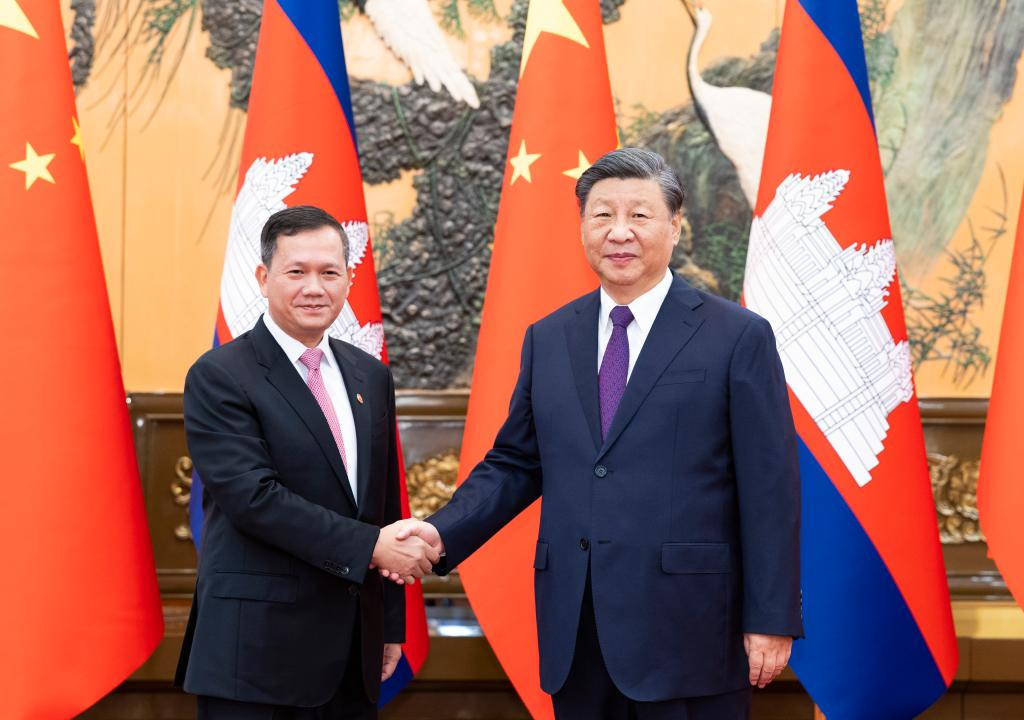
Chinese President Xi Jinping meets with Cambodian Prime Minister Hun Manet at the Great Hall of the People in Beijing, capital of China, Sep 15, 2023. Photo:Xinhua
A model for cooperation
When meeting with Hun Manet on Friday, Xi stressed that China firmly supports Cambodia in exploring a development path suited to its national conditions, and stands ready to maintain regular strategic communication with Cambodia and deepen the exchange of governance experience.
Hun Manet said that he chose China as the destination for his first official visit to show that the new Cambodian government will continue to firmly pursue a friendly policy toward China and further carry forward the ironclad friendship between Cambodia and China.
Hun Manet's visit to China illustrates China's important position in Cambodia's foreign relations and also indicates that the pragmatic cooperation between the two countries has been fruitful and holds great promise for the future, Gu Jiayun, director of the Center for Cambodian Studies at Beijing Foreign Studies University, told the Global Times.
The friendship between China and Cambodia is a model of cooperation between developing countries, and the two countries have a high level of mutual trust in politics, Shen Shishun, an Asia-Pacific affairs expert at the China Institute of International Studies, told the Global Times.
China and Cambodia also have strong economic and trade complementarity and China can provide Cambodia with the advanced industrial technology and help Cambodia with infrastructure construction that it currently needs, driving the development of underdeveloped areas. Most importantly, deepening the China-Cambodia relationship will not only benefit the people of both countries but also contribute to regional stability and the expansion of mutually beneficial cooperation within the region, said Shen.
During the Friday meeting, Xi also noted that China and Cambodia should make good use of the mechanism of the intergovernmental coordinating committee and implement the new action plan for building a China-Cambodia community with a shared future.
Xi also called on both sides to enrich the China-Cambodia "Diamond Hexagon" cooperation framework, jointly build the "Industrial Development Corridor" and the "Fish and Rice Corridor," and promote the early implementation of relevant key cooperation projects.
Hun Manet said that Cambodia appreciates China's long-term strong support and assistance for Cambodia's economic and social development, and is willing to work with China to implement the important consensus reached by the leaders of the two countries, deepen Belt and Road cooperation, and push for further development of bilateral cooperation in industry, agriculture, investment, culture and other fields under the "Diamond Hexagon" framework.
Hun Manet is the eldest son and successor of Hun Sen and took office in August. After visiting China, he will reportedly attend the UN General Assembly in New York, US this month.
In response to some US media's hyping of Hun Manet's visit to the US, Shen said that the US has intensified efforts to draw countries around China into an anti-China camp. But the China-Cambodia relationship has withstood the test of time. Any attempt to sow discord will not succeed.
Gu noted that China's ironclad friendship with Cambodia is not targeted at any third party, as their friendly relations are based on equality, mutual benefit, and pragmatic cooperation.
China is happy to see Cambodia receive more assistance for its national development and hopes that more countries will sincerely help Cambodia's development, rather than engage in the zero-sum game based on geopolitical factors and force Cambodia to choose sides or imply the possibility of "choosing sides," said Gu.
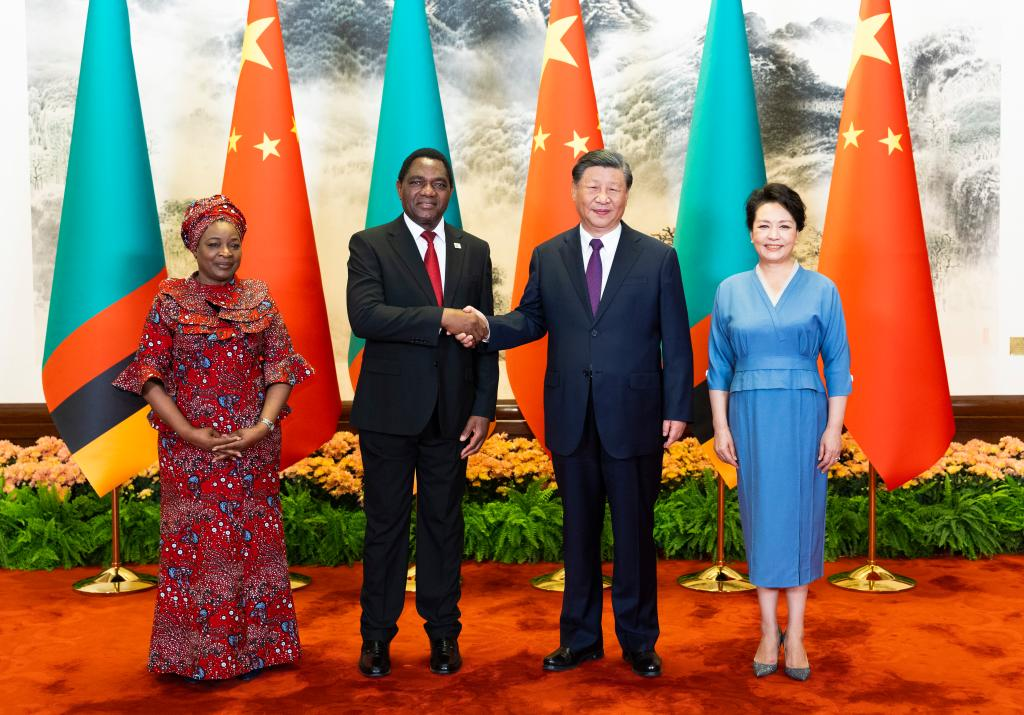
Chinese President Xi Jinping and his wife Peng Liyuan pose for a group photo with Zambian President Hakainde Hichilema and his wife Mutinta before the talks between Xi and Hichilema in Beijing, capital of China, Sep 15, 2023. Xi held talks with Hichilema, who is paying a state visit to China, at the Great Hall of the People in Beijing on Friday. Photo:Xinhua
Contribution to global devt
Zambia is also a country that shares long-term friendship with China. During the meeting with President Hichilema, Xi said that China has always viewed and developed China-Zambia relations from a strategic and long-term perspective, and stands ready to work with Zambia to transform the profound traditional friendship into a strong driving force for win-win cooperation in the new era and push bilateral relations to a new level.
China hopes to jointly build the Belt and Road with Zambia and expand cooperation in infrastructure construction, agriculture, mining and clean energy to achieve common development and revitalization, Xi said.
China encourages more quality Zambian products to enter the Chinese market and supports more Chinese enterprises in investing in Zambia, the Chinese president said.
Noting that the collective rise of developing countries and their increasing international influence have become an irreversible trend of the times, Xi said China and Zambia need to strengthen solidarity and coordination, practice genuine multilateralism, firmly uphold international fairness and justice, strive to increase the voice of developing countries, and safeguard the common interests of the two countries and other developing countries.
Hichilema said Zambia cherishes the friendship forged by the older generations of leaders of the two countries.
China's development has led to the progress of countries in the Global South, increased their representation and voice in international affairs, and promoted the development of international order in a more just and rational direction, Hichilema said.
Hichilema's visit and the elevation of bilateral relations will further facilitate and expand cooperation in development, trade, and economy between the two countries. It will also help Zambia achieve its sustainable development agenda by 2030 and recover from the impact of the COVID-19 pandemic, Song Wei, a professor at the School of International Relations and Diplomacy at Beijing Foreign Studies University, told the Global Times.
The specific areas of cooperation between the two countries, such as industrial processing and digitalization, and projects under the Belt and Road Initiative are of great significance in promoting Zambia's integration into the global value chain, said Song.
The past few weeks have witnessed frequent high-level interactions between China and African countries - from President Xi's state visit to South Africa and meeting with African leaders to Beninese President Patrice Athanase Guillaume Talon's visit to China in early September, which came in direct response to the Western countries' touting of so-called neo-colonialism or debt trap narratives against China, and they also underscore the importance of strengthening China-Africa cooperation in the current international landscape, analysts said.
Africa is facing a challenging task of economic recovery and due to power struggles and instability, particularly in West Africa, the continent needs strategic support from China more than ever. China, as a member of the BRICS mechanism, also plays a leading role in contributing to the development of developing countries and guiding global governance to reflect the needs of more developing countries, said Song.
After the pandemic, China's diplomacy has regained a relatively active and positive posture, Su Hao, director of the Asia-Pacific Research Centre at the China Foreign Affairs University, said about the recent flurry of diplomatic activities.
As a major developing country, China plays a very important role in promoting the overall economic recovery and development of the Global South. Its active participation in various multilateral platforms such as BRICS, the Shanghai Cooperation Organization, and G20 will also increase the voice of developing countries, promoting global governance to better reflect the demands of developing countries, said Su.


